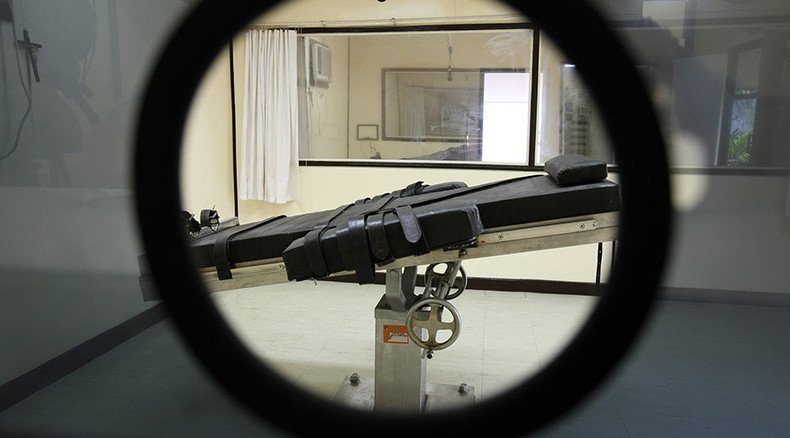Not ‘ultra-fast’ enough: Montana judge blocks state’s lethal injection drug

A Montana judge ruled that one of the drugs planned for use in a lethal injection mix for executions violated the law, effectively halting all executions in the state until the legislation is changed. There are currently two inmates on death row.
“The State of Montana is hereby enjoined from using the drug pentobarbital in its lethal injection protocol unless and until the statute authorizing lethal injection is modified in conformance with this decision,” District Judge Jeffrey Sherlock wrote on Tuesday.
Under Montana law, one of the drugs used in its lethal injection combination must be an “ultra-fast acting barbiturate,” in order to put the inmate into a coma, followed by a paralytic agent called pancuronium. The state’s execution protocol lists sodium pentothal as the barbiturate, with pentobarbital as a substitute.
Sodium pentothal is no longer manufactured in the US, however, and it can’t be imported. Meanwhile, pentobarbital is used for lethal injections in other states and, while the drug does act quickly, Sherlock ruled it does not meet the “ultra-fast” classification.
“Under the express terms of the statute, the State of Montana is not allowed to use the ‘fastest acting barbiturate available’ or a ‘relatively fast-acting barbiturate,’ only an ‘ultra-fast barbiturate,” the judge wrote, according to Reuters.
The trial begins if a drug used in lethal injection is "ultra fast." #Newsforyou#Helena#GreatFalls#Montanapic.twitter.com/u2Vmah55cU
— MattWitkosNBC (@MattWitkosNBC) September 2, 2015The judge stressed that his ruling does not concern whether the death penalty is constitutional or whether the drug’s use constitutes cruel and usual punishment, but only whether the drug satisfied the law.
Only four barbiturates can be classified as “ultra-fast acting” – sodium pentothal, thiopental, thiamylal and methohexital.
During court testimony last month, Dr. Mark Heath, a Columbia University anesthesiologist, said sodium pentothal takes effect immediately, while an inmate injected with pentobarbital would breathe longer, move his body and slur his words.
Fourteen states use pentobarbital in executions, according to the Death Penalty Information Center, which monitors capital punishment in the United States. The drug is also used in physician-assisted suicides in Europe and to euthanize animals.
Drug makers, mostly from Europe, began banning the sale of drugs for use in executions about four years ago, citing ethical reasons. States have been forced to find new combinations and have turned to lightly regulated compounding pharmacies that can mix chemicals for their execution drugs.
Tennessee judge rules the usage of lethal injections for executions is constitutional http://t.co/dAjzRbQx4rpic.twitter.com/n8Mc1jo2Af
— RT America (@RT_America) August 27, 2015A Montana Department of Justice spokesman, John Barnes, told the Associated Press that state attorneys are reviewing the court’s decision.
The ruling was made to settle a lawsuit brought by the American Civil Liberties Union of Montana on behalf of the state’s two death row inmates, Ronald Allen Smith and William Gollehon. The lawsuit argued the inmates would suffer if the barbiturate didn’t act fast enough.
“While ACLU will continue to fight for the abolition of the death penalty in Montana, we are gratified that, in the short term, our state will be staying out of the business of killing people,” Caitlin Borgmann, executive director of the ACLU of Montana, told the AP.












